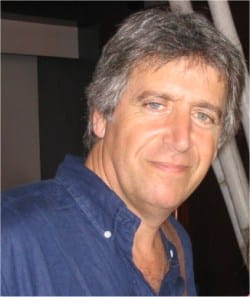He annoys Renaud because when you read his texts, it feels like you’re singing them.
He is compared to Georges Brassens, and his song “Prendre un enfant par la main” has been chosen as the song of the twentieth century by the French. “He,” of course, is Yves Duteil, a man in his fifties with indigo eyes who has made all the children of France and elsewhere sing.
The first thing the public at Fnac noticed last Friday, May 5, was: “He hasn’t changed.” Yes, Yves Duteil hasn’t changed; he remains the same: a generous, modest, and tolerant humanist, an understanding, authentic, compassionate man who isn’t prideful, as a certain Bernard, an unfortunate opponent who wrote him a letter, described him. The letters? They compose his book in which he writes “The things we do not say” to his parents, to God, to …
So, we meet “a defender of the beauty of the French language, a lover of living French,” as he likes to describe himself.
Nice-Première: Originally, the title of your book “The things we do not say” is the title of one of your songs. How does one transform a song into a book?
Yves Duteil: By going a bit further, by freeing oneself from the constraints of music and versification. You feel much freer in the kind of letter you are going to write, since it’s a book of letters. We found the title after the book was written. The title imposed itself while all the letters had been written.
N-P: Why publish this book now?
Y.D.: It’s now that Jean Daniel Belfond, the publisher from the archipelago, suggested this concept of a book of letters, and that triggered the desire to write. The idea appealed to me to express through letters addressed to people or things that are central to my life. These are letters that personify things and speak to beings. The idea was very appealing because it’s a way to write and describe a life without talking about oneself, which is unlike the usual approach.
N-P: How did you choose the recipients of your letters?
Y.D.: Completely arbitrarily. At first, we made a rough list then I was inspired by the mood to write this or that letter I picked from the list. Initially, I had about fifteen letters and ended up with 43. The book grew letter by letter, day by day. For example, “The Letter to Chocolate,” I’m going to sing tonight with a Corsican friend with whom I often make music for pleasure late into the night. During these evenings, there is always a bar of chocolate on the table. One evening; Jean Pierre told me: “You should write a letter to chocolate,” and the letter was written the next day. It came partly from planning and partly from the inspiration of the moment.
N-P: This year, the 11th Nice Book Festival has correspondence as its theme. What place do you think it has in the 21st century?
Y.D.: It has a significant place. It takes various forms, very different according to tastes because we have diversified the way we write. Before we either wrote a letter or we didn’t. Today, you can write emails, send a fax, send an SMS and each of these letters, whether small or large, deep or light, finds and takes its place. These are ways to develop correspondence in another manner. SMS with abbreviated words, small signs of affection, fax has a more administrative way, email can become a family link across the planet between people who are separated and can communicate instantly. It’s extraordinary to have that at our disposal. Correspondence is developing.


